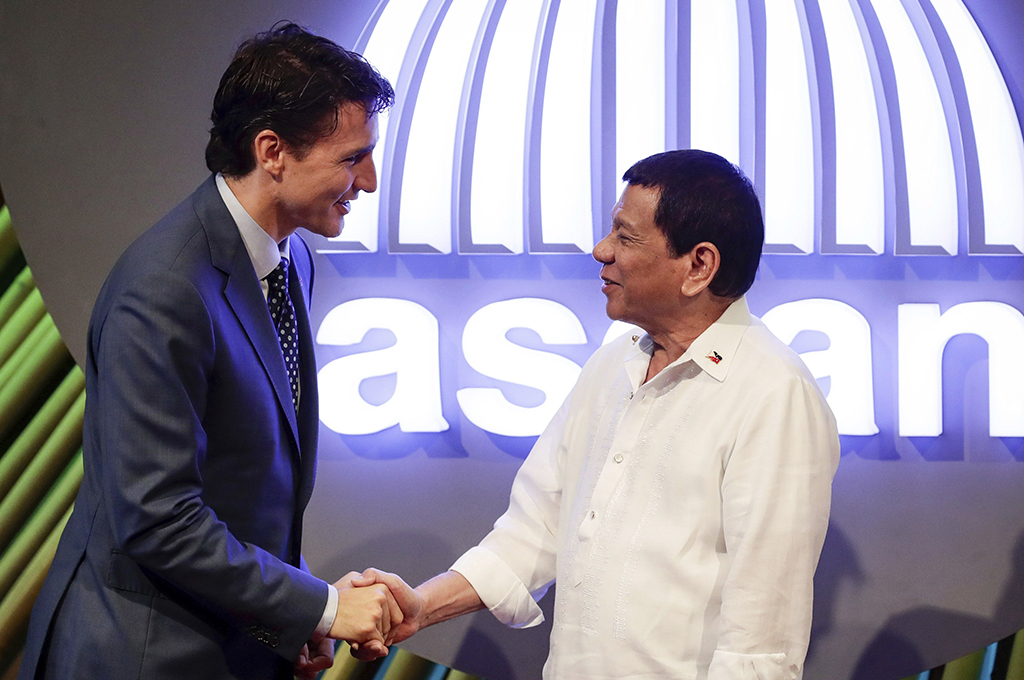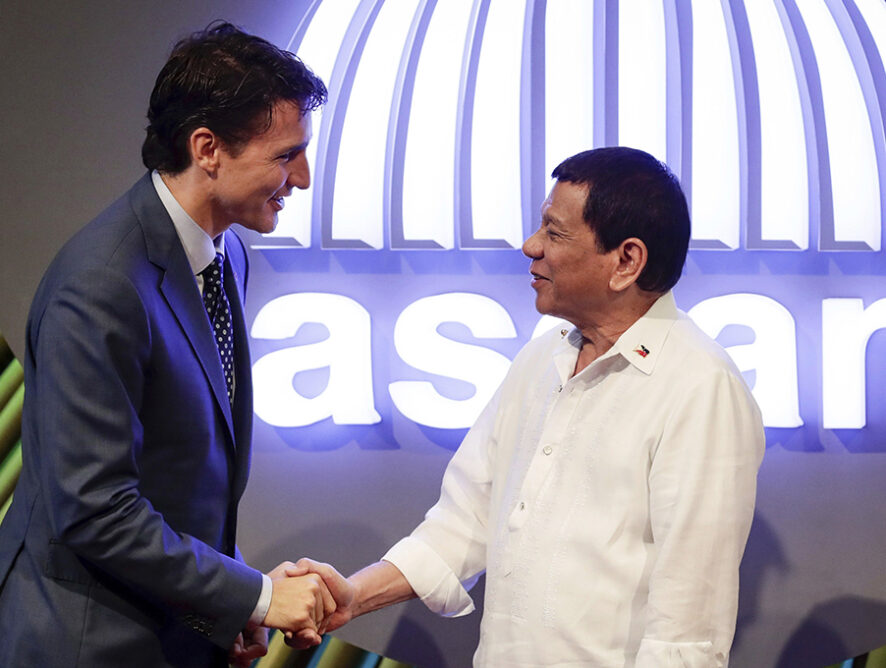
At the urging of his Filipino-Canadian constituents, Prime Minister Justin Trudeau dared to bring up “human rights” when he met with Philippine president Rodrigo “The Punisher” Duterte at the end of the 31st Summit of Association of Southeast Asian Nations (ASEAN) and Western nations in Manila. Had Trudeau taken the cue from former U.S. president Barack Obama, he would have skipped the subject matter. But like they say: the devil made him do it.
Obama, who tried to “lecture” Duterte on human rights last year at the ASEAN summit in Laos last year, earned the epithet of Duterte who warned that if Obama asked his government’s extrajudicial killings, “Putang ina (“son of a bitch” in Filipino), I will swear at you.” Well, Obama cancelled their meeting and said that Duterte was a “colorful guy.”
Indeed, Trudeau was only among a few world leaders who daringly raised the issue of human rights at the ASEAN summit. Known for championing human rights, Trudeau told a Canadian reporter that he discussed the issue with Duterte when they met for the ASEAN-Canada Commemorative Summit. He told Duterte that Canada was “concerned” over the human rights violations and extrajudicial killings happening in the Philippines as a result of Duterte’s “war on drugs” which has claimed the lives of thousands of drug suspects. He said in a press conference: “I also mentioned human rights, the rule of law and specifically extrajudicial killings as being an issue that Canada is concerned with. “I impressed on him the need for respect for the rule of law, and as always offered Canada’s support and help as a friend to move forward on what is a real challenge.”
Tons of garbage
But notwithstanding the appeals from Filipino-Canadians, Trudeau’s trip to Manila was confronted with another issue: Canadian trash dumped in Manila – 2,500 tons declared as “recyclable plastic scrap materials.” Chronic Plastics Incorporated (CPI), an export company base in Ontario, Canada, shipped it in 2013. It was consigned to Live Green Enterprise.
In January 2014, the Bureau of Customs (BOC) discovered the garbage when they opened the container vans as part of procedures on shipments not claimed for a long period of time. What they found was plastic bottles, plastic bags, newspapers, household garbage, and used adult diapers. The garbage was then classified as “hazardous” as per Toxic Substances and Hazardous and Nuclear Waste and Control Act of 1990, or Republic Act 6969.
In February 2014, the BOC filed a smuggling complaint against Adelfa Eduardo, owner of Chronic Plastics, and its licensed Customs brokers Leonora Flores and Shejun Saldon, for violating the Tariff and Customs Code of the Philippines.
In 2015, the Manila City Council adopted a resolution seeking to remove the 50 shipping containers. Today, the container vans are still at the Port of Manila.
But Canada had said that taking the garbage back is not that easy due to legalities. A spokesperson for Canada’s Department of Foreign Affairs, Trade and Development had said that there was nothing hazardous in the material shipped and that no laws exist to force Ontario Chronic Inc. to recall the shipping containers. This is in contradiction to what the BOC had found out when it inspected the cargo.
Theoretically possible
Trudeau is now saying that it is “now theoretically possible” for Canada to remove the trash. However, he explained that several issues need to be worked out, including who should bear financial responsibility? He said that “legal barriers and restrictions” are preventing Canada from taking the trash back. “Those impediments have now been addressed,” Trudeau said during a press briefing. Malacañang responded by saying that Duterte has faith that Trudeau will keep his promise to resolve the garbage issue.
One has to feel sorry for Trudeau because, (1) he wasn’t the Prime Minister when the garbage was shipped to the Philippines; and (2) he can’t find a way to go around Canadian law, which does not provide a mechanism to compel the return of illegal shipments to the port of origin. In other words, the Philippines is stuck with garbage that nobody wants.
Ultimately, Trudeau, who is now under pressure from world leaders to remove the trash, would have to bite the bullet and do what is right: take back the garbage at Canada’s cost. He is putting his reputation on the line as a strong advocate for climate change. He has to exert a strong political will to settle this stinking mess. Failure to do so would put a dark cloud over his political future.
Duterte on the other hand reacted with his usual expletive-laden attacks. He considered Trudeau’s comments as an “insult” both at personal and official levels. “It angers me when you are a foreigner and you do not know exactly what is happening in this country. You do not investigate … I only answer to the Filipino. I will not answer to any other bullshit, especially foreigners. Lay off,” he said.
But following Trudeau’s informal meeting with Duterte, Trudeau told the media, ”We impressed upon him the need to respect the rule of law and, as always, offered Canada’s support and help as a friend to help move forward. This is the way we engage with the world, this is the way we always will.” Then he added, diplomatically, “The President was receptive to my comments and it was throughout a very cordial and positive exchange.” But Duterte later told the media that he had refused to provide an explanation for the killings, which by some estimates is placed between 7,000 and 10,000 drug users in first year of his presidency.
Can’t win this battle
It’s interesting to note that while Trudeau had courageously brought up the issue of human rights and extrajudicial killings with Duterte, Trump avoided the subject – uncharacteristically — when the two met. Trump’s press secretary Sarah Huckabee Sanders said that human rights came up “briefly in the context of the Philippines’ fight against illegal drugs.” After their meeting, they issued a joint statement saying they “underscored that human rights and the dignity of human life are essential, and agreed to continue mainstreaming the human rights agenda in their national programs.”
Trump’s soft-pedaling on the issue of human rights may have prevented another outburst from Duterte, who would have gone ballistic. Trump probably thought that this is one battle he’s not going to win. He’d rather taunt North Korea’s leader Kim Jong-un, which would keep his political base agitated and revved up, than treat another loose cannon like a Sicilian Mafia don. The last thing Trump would want to see is to start a word war, which is worse than World War III where nobody has to suffer because all humankind will be annihilated.
Well, Trump got off the hook easily. The Punisher spared him. He was able to “discuss” human rights with the Punisher, albeit in passing. Indeed, age has its advantage after all. But the boyish-looking Trudeau, who has the temerity of a tiger but a novice in the art of war, had incurred the wrath of the Punisher.


